Organisational Behaviour and Leadership Analysis: Tesco's Case Study
VerifiedAdded on 2023/01/12
|16
|5001
|91
Report
AI Summary
This report provides an in-depth analysis of organisational behaviour, using Tesco as a case study. It examines the impact of organisational culture, politics, and power on individual and team performance. The report explores various motivation theories, including Maslow's Hierarchy of Needs, and evaluates their application within Tesco. It also delves into the characteristics of effective and ineffective teams, applying the Tuckman model for team development. Furthermore, the report considers the application of the path-goal theory in a business context, providing a comprehensive overview of key organisational behaviour concepts and their practical implications. The report concludes with an assessment of how these factors influence employee behaviour and contribute to the achievement of organisational goals and objectives.
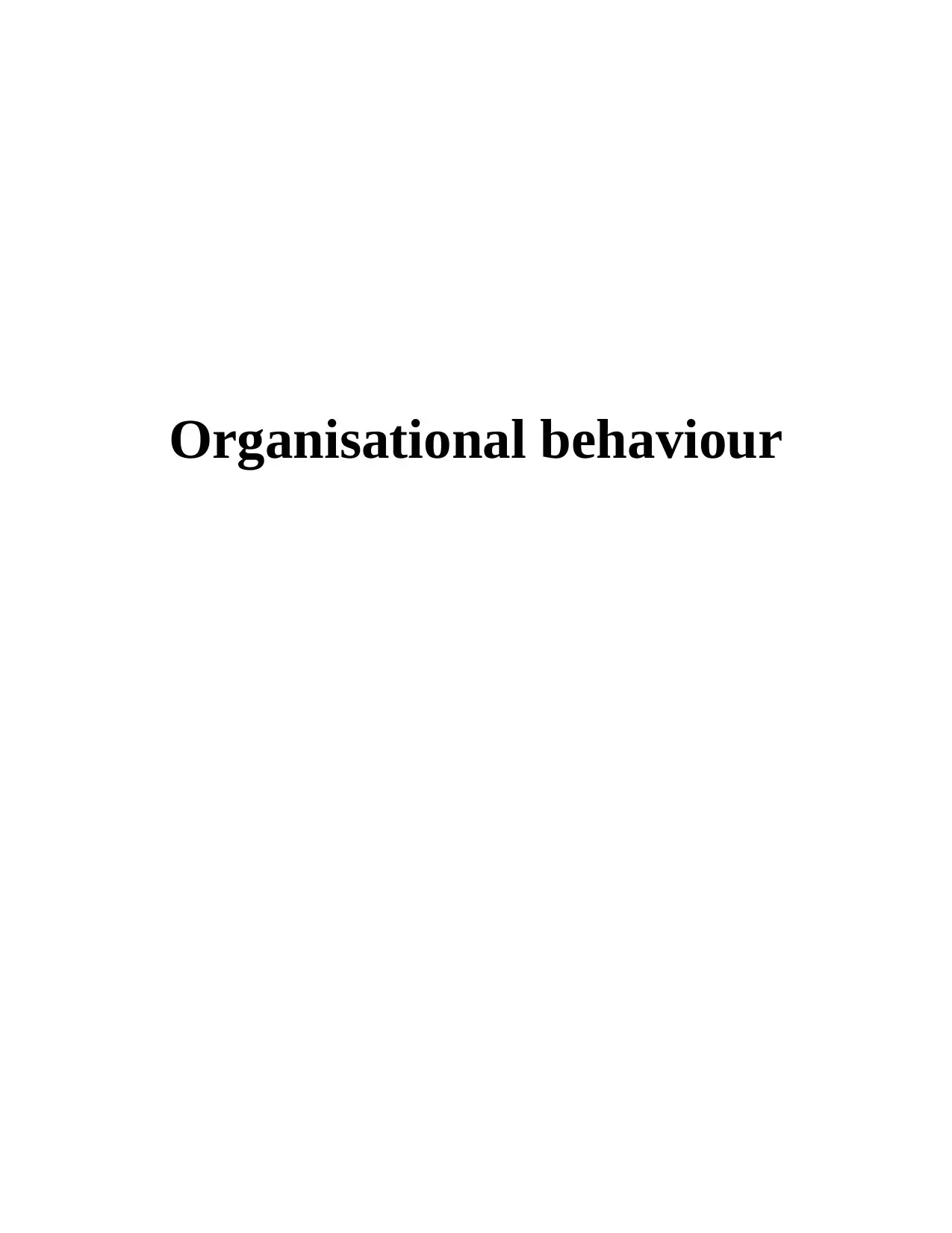
Organisational behaviour
Paraphrase This Document
Need a fresh take? Get an instant paraphrase of this document with our AI Paraphraser
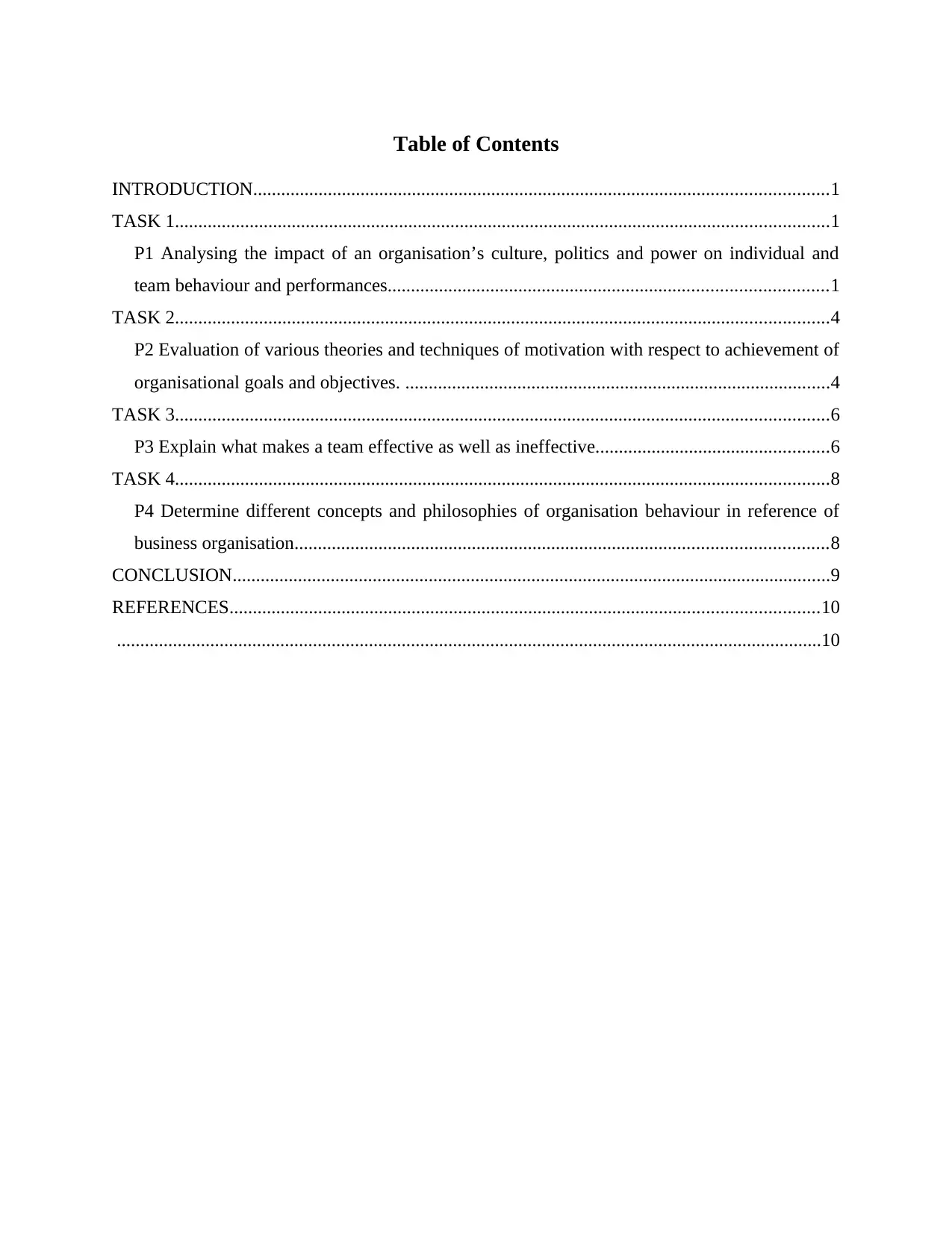
Table of Contents
INTRODUCTION...........................................................................................................................1
TASK 1............................................................................................................................................1
P1 Analysing the impact of an organisation’s culture, politics and power on individual and
team behaviour and performances..............................................................................................1
TASK 2............................................................................................................................................4
P2 Evaluation of various theories and techniques of motivation with respect to achievement of
organisational goals and objectives. ...........................................................................................4
TASK 3............................................................................................................................................6
P3 Explain what makes a team effective as well as ineffective..................................................6
TASK 4............................................................................................................................................8
P4 Determine different concepts and philosophies of organisation behaviour in reference of
business organisation..................................................................................................................8
CONCLUSION................................................................................................................................9
REFERENCES..............................................................................................................................10
.......................................................................................................................................................10
INTRODUCTION...........................................................................................................................1
TASK 1............................................................................................................................................1
P1 Analysing the impact of an organisation’s culture, politics and power on individual and
team behaviour and performances..............................................................................................1
TASK 2............................................................................................................................................4
P2 Evaluation of various theories and techniques of motivation with respect to achievement of
organisational goals and objectives. ...........................................................................................4
TASK 3............................................................................................................................................6
P3 Explain what makes a team effective as well as ineffective..................................................6
TASK 4............................................................................................................................................8
P4 Determine different concepts and philosophies of organisation behaviour in reference of
business organisation..................................................................................................................8
CONCLUSION................................................................................................................................9
REFERENCES..............................................................................................................................10
.......................................................................................................................................................10

⊘ This is a preview!⊘
Do you want full access?
Subscribe today to unlock all pages.

Trusted by 1+ million students worldwide

INTRODUCTION
Organisational behaviour is referred as the study to determine the way an individual or a person
behave with others in an organisational setting. it is very necessary for the leader and manager to
ensure that all the employees behave well with others at workplace so that productivity can be
improved. This report is based on Tesco which is a British grocery retailer of United kingdom
and offers variety of products and services to customers. This report covers description about the
way the culture, politics and power impacts of behaviour and performance of team and
individuals. it also includes content and process motivation theoriesalong with discussion of
effective and ineffective team. Tuckman team development model is applied in order to develop
effective team within organisation. At last, path goal theory is applied on a specific situation in
reference to business organisation.
TASK 1
P1 Analysing the impact of an organisation’s culture, politics and power on individual and team
behaviour and performances
Organisational culture:
Organisational culture refers to a model of shared beliefs, assumptions and values which
act as a governing body of how people behave in an organisation. Culture within an organisation
has huge impact on the performance of its employees and how they behave. There is not a
perfect or defined model of organisational culture which can be implemented in every
organisation since every organisation differ in terms of its operations, size, objectives, resources
etcetera (Bakotić, 2016). Organisational culture plays a crucial role in success of an
organisation. Many models have been proposed that try to explain the organisational culture, one
of them is Charles Handy’s model under which he has defined four types of culture that may
exist within an organisation. Here are the four types of cultures which any organisation may
practice:
Power culture:
In many organisations, the power or the authority remains only in the hands of a few
people. Only these people are responsible for the decision-making and also enjoy some special
privileges at the workplace. The employees of such organisation have no option but to follow the
1
Organisational behaviour is referred as the study to determine the way an individual or a person
behave with others in an organisational setting. it is very necessary for the leader and manager to
ensure that all the employees behave well with others at workplace so that productivity can be
improved. This report is based on Tesco which is a British grocery retailer of United kingdom
and offers variety of products and services to customers. This report covers description about the
way the culture, politics and power impacts of behaviour and performance of team and
individuals. it also includes content and process motivation theoriesalong with discussion of
effective and ineffective team. Tuckman team development model is applied in order to develop
effective team within organisation. At last, path goal theory is applied on a specific situation in
reference to business organisation.
TASK 1
P1 Analysing the impact of an organisation’s culture, politics and power on individual and team
behaviour and performances
Organisational culture:
Organisational culture refers to a model of shared beliefs, assumptions and values which
act as a governing body of how people behave in an organisation. Culture within an organisation
has huge impact on the performance of its employees and how they behave. There is not a
perfect or defined model of organisational culture which can be implemented in every
organisation since every organisation differ in terms of its operations, size, objectives, resources
etcetera (Bakotić, 2016). Organisational culture plays a crucial role in success of an
organisation. Many models have been proposed that try to explain the organisational culture, one
of them is Charles Handy’s model under which he has defined four types of culture that may
exist within an organisation. Here are the four types of cultures which any organisation may
practice:
Power culture:
In many organisations, the power or the authority remains only in the hands of a few
people. Only these people are responsible for the decision-making and also enjoy some special
privileges at the workplace. The employees of such organisation have no option but to follow the
1
Paraphrase This Document
Need a fresh take? Get an instant paraphrase of this document with our AI Paraphraser
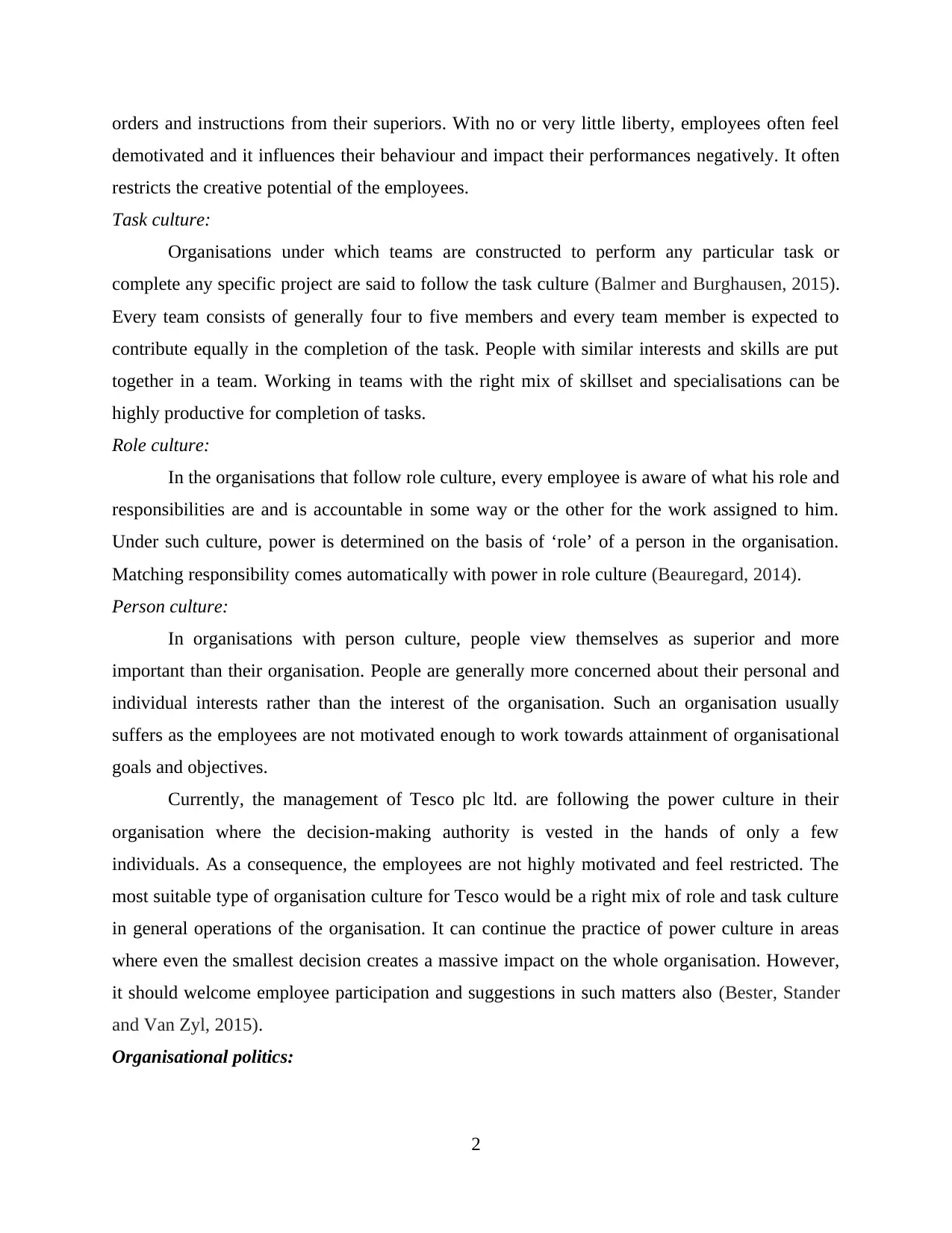
orders and instructions from their superiors. With no or very little liberty, employees often feel
demotivated and it influences their behaviour and impact their performances negatively. It often
restricts the creative potential of the employees.
Task culture:
Organisations under which teams are constructed to perform any particular task or
complete any specific project are said to follow the task culture (Balmer and Burghausen, 2015).
Every team consists of generally four to five members and every team member is expected to
contribute equally in the completion of the task. People with similar interests and skills are put
together in a team. Working in teams with the right mix of skillset and specialisations can be
highly productive for completion of tasks.
Role culture:
In the organisations that follow role culture, every employee is aware of what his role and
responsibilities are and is accountable in some way or the other for the work assigned to him.
Under such culture, power is determined on the basis of ‘role’ of a person in the organisation.
Matching responsibility comes automatically with power in role culture (Beauregard, 2014).
Person culture:
In organisations with person culture, people view themselves as superior and more
important than their organisation. People are generally more concerned about their personal and
individual interests rather than the interest of the organisation. Such an organisation usually
suffers as the employees are not motivated enough to work towards attainment of organisational
goals and objectives.
Currently, the management of Tesco plc ltd. are following the power culture in their
organisation where the decision-making authority is vested in the hands of only a few
individuals. As a consequence, the employees are not highly motivated and feel restricted. The
most suitable type of organisation culture for Tesco would be a right mix of role and task culture
in general operations of the organisation. It can continue the practice of power culture in areas
where even the smallest decision creates a massive impact on the whole organisation. However,
it should welcome employee participation and suggestions in such matters also (Bester, Stander
and Van Zyl, 2015).
Organisational politics:
2
demotivated and it influences their behaviour and impact their performances negatively. It often
restricts the creative potential of the employees.
Task culture:
Organisations under which teams are constructed to perform any particular task or
complete any specific project are said to follow the task culture (Balmer and Burghausen, 2015).
Every team consists of generally four to five members and every team member is expected to
contribute equally in the completion of the task. People with similar interests and skills are put
together in a team. Working in teams with the right mix of skillset and specialisations can be
highly productive for completion of tasks.
Role culture:
In the organisations that follow role culture, every employee is aware of what his role and
responsibilities are and is accountable in some way or the other for the work assigned to him.
Under such culture, power is determined on the basis of ‘role’ of a person in the organisation.
Matching responsibility comes automatically with power in role culture (Beauregard, 2014).
Person culture:
In organisations with person culture, people view themselves as superior and more
important than their organisation. People are generally more concerned about their personal and
individual interests rather than the interest of the organisation. Such an organisation usually
suffers as the employees are not motivated enough to work towards attainment of organisational
goals and objectives.
Currently, the management of Tesco plc ltd. are following the power culture in their
organisation where the decision-making authority is vested in the hands of only a few
individuals. As a consequence, the employees are not highly motivated and feel restricted. The
most suitable type of organisation culture for Tesco would be a right mix of role and task culture
in general operations of the organisation. It can continue the practice of power culture in areas
where even the smallest decision creates a massive impact on the whole organisation. However,
it should welcome employee participation and suggestions in such matters also (Bester, Stander
and Van Zyl, 2015).
Organisational politics:
2
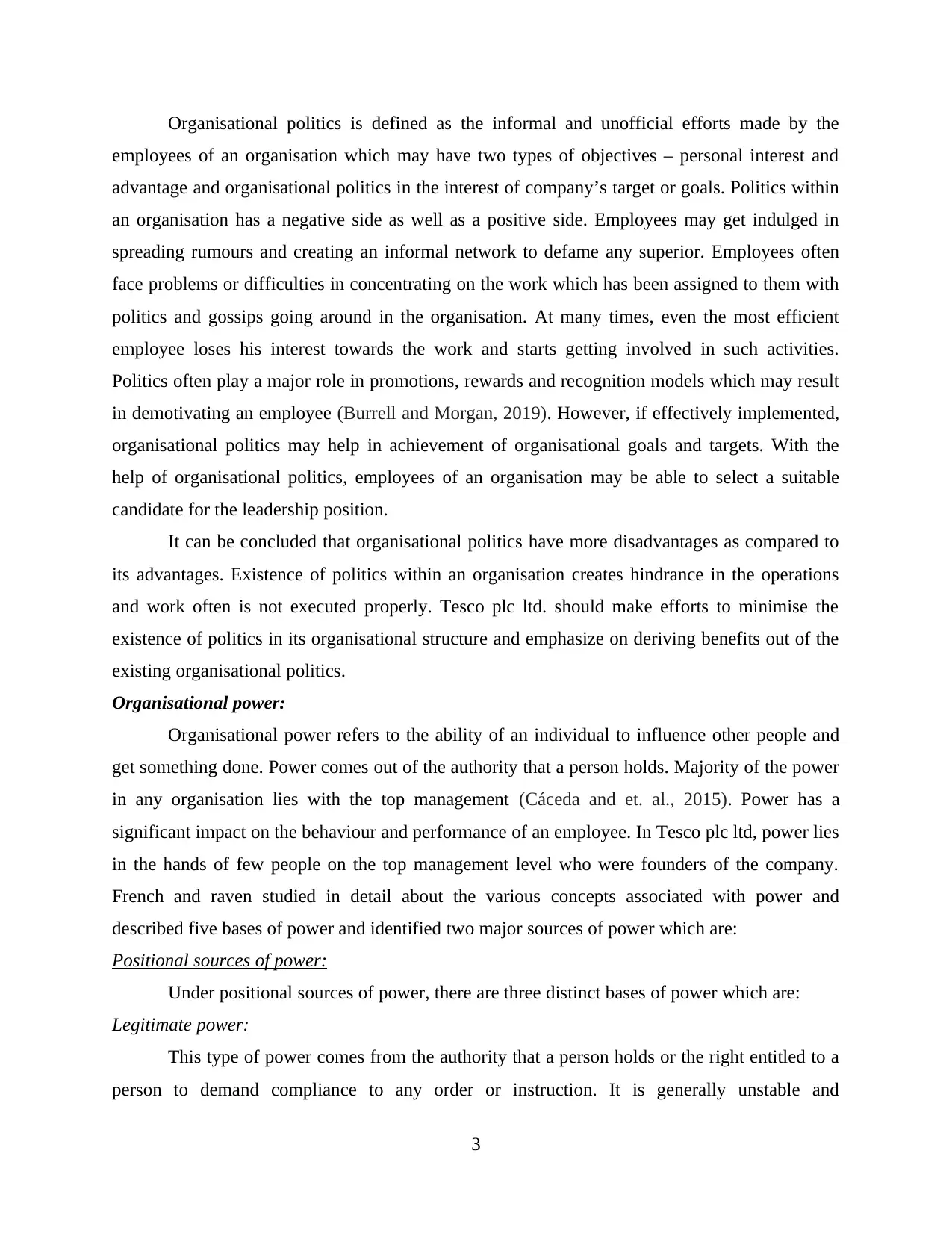
Organisational politics is defined as the informal and unofficial efforts made by the
employees of an organisation which may have two types of objectives – personal interest and
advantage and organisational politics in the interest of company’s target or goals. Politics within
an organisation has a negative side as well as a positive side. Employees may get indulged in
spreading rumours and creating an informal network to defame any superior. Employees often
face problems or difficulties in concentrating on the work which has been assigned to them with
politics and gossips going around in the organisation. At many times, even the most efficient
employee loses his interest towards the work and starts getting involved in such activities.
Politics often play a major role in promotions, rewards and recognition models which may result
in demotivating an employee (Burrell and Morgan, 2019). However, if effectively implemented,
organisational politics may help in achievement of organisational goals and targets. With the
help of organisational politics, employees of an organisation may be able to select a suitable
candidate for the leadership position.
It can be concluded that organisational politics have more disadvantages as compared to
its advantages. Existence of politics within an organisation creates hindrance in the operations
and work often is not executed properly. Tesco plc ltd. should make efforts to minimise the
existence of politics in its organisational structure and emphasize on deriving benefits out of the
existing organisational politics.
Organisational power:
Organisational power refers to the ability of an individual to influence other people and
get something done. Power comes out of the authority that a person holds. Majority of the power
in any organisation lies with the top management (Cáceda and et. al., 2015). Power has a
significant impact on the behaviour and performance of an employee. In Tesco plc ltd, power lies
in the hands of few people on the top management level who were founders of the company.
French and raven studied in detail about the various concepts associated with power and
described five bases of power and identified two major sources of power which are:
Positional sources of power:
Under positional sources of power, there are three distinct bases of power which are:
Legitimate power:
This type of power comes from the authority that a person holds or the right entitled to a
person to demand compliance to any order or instruction. It is generally unstable and
3
employees of an organisation which may have two types of objectives – personal interest and
advantage and organisational politics in the interest of company’s target or goals. Politics within
an organisation has a negative side as well as a positive side. Employees may get indulged in
spreading rumours and creating an informal network to defame any superior. Employees often
face problems or difficulties in concentrating on the work which has been assigned to them with
politics and gossips going around in the organisation. At many times, even the most efficient
employee loses his interest towards the work and starts getting involved in such activities.
Politics often play a major role in promotions, rewards and recognition models which may result
in demotivating an employee (Burrell and Morgan, 2019). However, if effectively implemented,
organisational politics may help in achievement of organisational goals and targets. With the
help of organisational politics, employees of an organisation may be able to select a suitable
candidate for the leadership position.
It can be concluded that organisational politics have more disadvantages as compared to
its advantages. Existence of politics within an organisation creates hindrance in the operations
and work often is not executed properly. Tesco plc ltd. should make efforts to minimise the
existence of politics in its organisational structure and emphasize on deriving benefits out of the
existing organisational politics.
Organisational power:
Organisational power refers to the ability of an individual to influence other people and
get something done. Power comes out of the authority that a person holds. Majority of the power
in any organisation lies with the top management (Cáceda and et. al., 2015). Power has a
significant impact on the behaviour and performance of an employee. In Tesco plc ltd, power lies
in the hands of few people on the top management level who were founders of the company.
French and raven studied in detail about the various concepts associated with power and
described five bases of power and identified two major sources of power which are:
Positional sources of power:
Under positional sources of power, there are three distinct bases of power which are:
Legitimate power:
This type of power comes from the authority that a person holds or the right entitled to a
person to demand compliance to any order or instruction. It is generally unstable and
3
⊘ This is a preview!⊘
Do you want full access?
Subscribe today to unlock all pages.

Trusted by 1+ million students worldwide
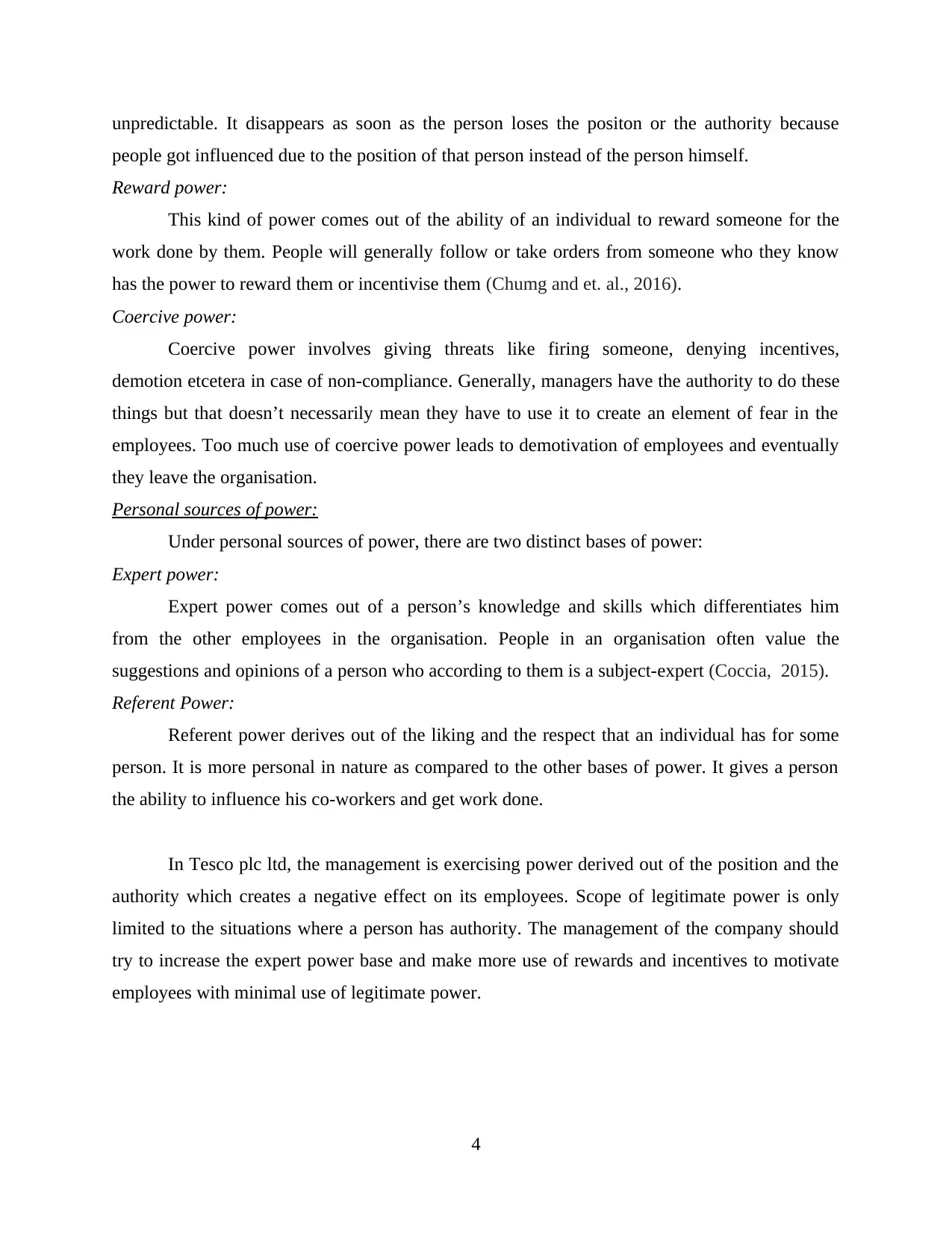
unpredictable. It disappears as soon as the person loses the positon or the authority because
people got influenced due to the position of that person instead of the person himself.
Reward power:
This kind of power comes out of the ability of an individual to reward someone for the
work done by them. People will generally follow or take orders from someone who they know
has the power to reward them or incentivise them (Chumg and et. al., 2016).
Coercive power:
Coercive power involves giving threats like firing someone, denying incentives,
demotion etcetera in case of non-compliance. Generally, managers have the authority to do these
things but that doesn’t necessarily mean they have to use it to create an element of fear in the
employees. Too much use of coercive power leads to demotivation of employees and eventually
they leave the organisation.
Personal sources of power:
Under personal sources of power, there are two distinct bases of power:
Expert power:
Expert power comes out of a person’s knowledge and skills which differentiates him
from the other employees in the organisation. People in an organisation often value the
suggestions and opinions of a person who according to them is a subject-expert (Coccia, 2015).
Referent Power:
Referent power derives out of the liking and the respect that an individual has for some
person. It is more personal in nature as compared to the other bases of power. It gives a person
the ability to influence his co-workers and get work done.
In Tesco plc ltd, the management is exercising power derived out of the position and the
authority which creates a negative effect on its employees. Scope of legitimate power is only
limited to the situations where a person has authority. The management of the company should
try to increase the expert power base and make more use of rewards and incentives to motivate
employees with minimal use of legitimate power.
4
people got influenced due to the position of that person instead of the person himself.
Reward power:
This kind of power comes out of the ability of an individual to reward someone for the
work done by them. People will generally follow or take orders from someone who they know
has the power to reward them or incentivise them (Chumg and et. al., 2016).
Coercive power:
Coercive power involves giving threats like firing someone, denying incentives,
demotion etcetera in case of non-compliance. Generally, managers have the authority to do these
things but that doesn’t necessarily mean they have to use it to create an element of fear in the
employees. Too much use of coercive power leads to demotivation of employees and eventually
they leave the organisation.
Personal sources of power:
Under personal sources of power, there are two distinct bases of power:
Expert power:
Expert power comes out of a person’s knowledge and skills which differentiates him
from the other employees in the organisation. People in an organisation often value the
suggestions and opinions of a person who according to them is a subject-expert (Coccia, 2015).
Referent Power:
Referent power derives out of the liking and the respect that an individual has for some
person. It is more personal in nature as compared to the other bases of power. It gives a person
the ability to influence his co-workers and get work done.
In Tesco plc ltd, the management is exercising power derived out of the position and the
authority which creates a negative effect on its employees. Scope of legitimate power is only
limited to the situations where a person has authority. The management of the company should
try to increase the expert power base and make more use of rewards and incentives to motivate
employees with minimal use of legitimate power.
4
Paraphrase This Document
Need a fresh take? Get an instant paraphrase of this document with our AI Paraphraser
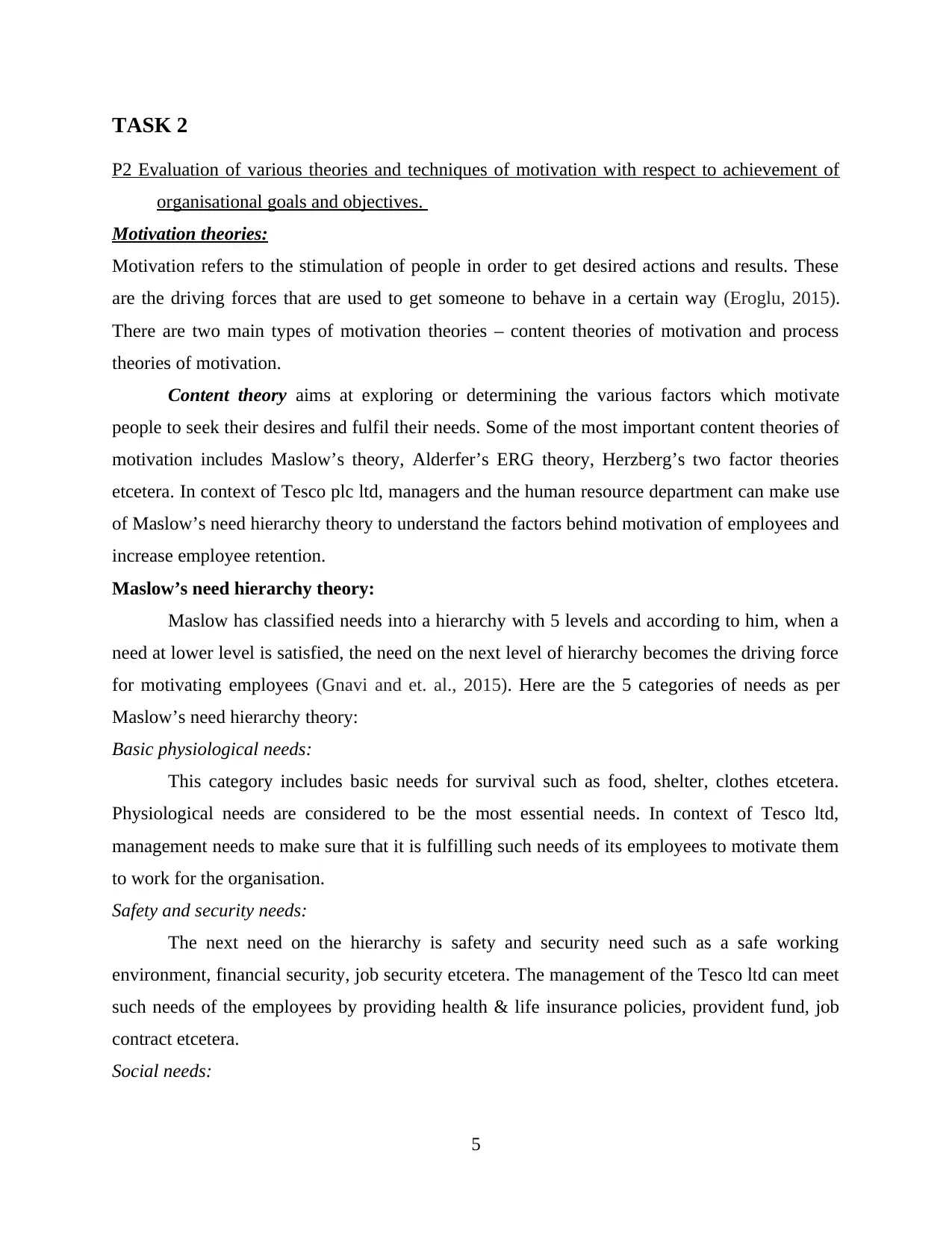
TASK 2
P2 Evaluation of various theories and techniques of motivation with respect to achievement of
organisational goals and objectives.
Motivation theories:
Motivation refers to the stimulation of people in order to get desired actions and results. These
are the driving forces that are used to get someone to behave in a certain way (Eroglu, 2015).
There are two main types of motivation theories – content theories of motivation and process
theories of motivation.
Content theory aims at exploring or determining the various factors which motivate
people to seek their desires and fulfil their needs. Some of the most important content theories of
motivation includes Maslow’s theory, Alderfer’s ERG theory, Herzberg’s two factor theories
etcetera. In context of Tesco plc ltd, managers and the human resource department can make use
of Maslow’s need hierarchy theory to understand the factors behind motivation of employees and
increase employee retention.
Maslow’s need hierarchy theory:
Maslow has classified needs into a hierarchy with 5 levels and according to him, when a
need at lower level is satisfied, the need on the next level of hierarchy becomes the driving force
for motivating employees (Gnavi and et. al., 2015). Here are the 5 categories of needs as per
Maslow’s need hierarchy theory:
Basic physiological needs:
This category includes basic needs for survival such as food, shelter, clothes etcetera.
Physiological needs are considered to be the most essential needs. In context of Tesco ltd,
management needs to make sure that it is fulfilling such needs of its employees to motivate them
to work for the organisation.
Safety and security needs:
The next need on the hierarchy is safety and security need such as a safe working
environment, financial security, job security etcetera. The management of the Tesco ltd can meet
such needs of the employees by providing health & life insurance policies, provident fund, job
contract etcetera.
Social needs:
5
P2 Evaluation of various theories and techniques of motivation with respect to achievement of
organisational goals and objectives.
Motivation theories:
Motivation refers to the stimulation of people in order to get desired actions and results. These
are the driving forces that are used to get someone to behave in a certain way (Eroglu, 2015).
There are two main types of motivation theories – content theories of motivation and process
theories of motivation.
Content theory aims at exploring or determining the various factors which motivate
people to seek their desires and fulfil their needs. Some of the most important content theories of
motivation includes Maslow’s theory, Alderfer’s ERG theory, Herzberg’s two factor theories
etcetera. In context of Tesco plc ltd, managers and the human resource department can make use
of Maslow’s need hierarchy theory to understand the factors behind motivation of employees and
increase employee retention.
Maslow’s need hierarchy theory:
Maslow has classified needs into a hierarchy with 5 levels and according to him, when a
need at lower level is satisfied, the need on the next level of hierarchy becomes the driving force
for motivating employees (Gnavi and et. al., 2015). Here are the 5 categories of needs as per
Maslow’s need hierarchy theory:
Basic physiological needs:
This category includes basic needs for survival such as food, shelter, clothes etcetera.
Physiological needs are considered to be the most essential needs. In context of Tesco ltd,
management needs to make sure that it is fulfilling such needs of its employees to motivate them
to work for the organisation.
Safety and security needs:
The next need on the hierarchy is safety and security need such as a safe working
environment, financial security, job security etcetera. The management of the Tesco ltd can meet
such needs of the employees by providing health & life insurance policies, provident fund, job
contract etcetera.
Social needs:
5
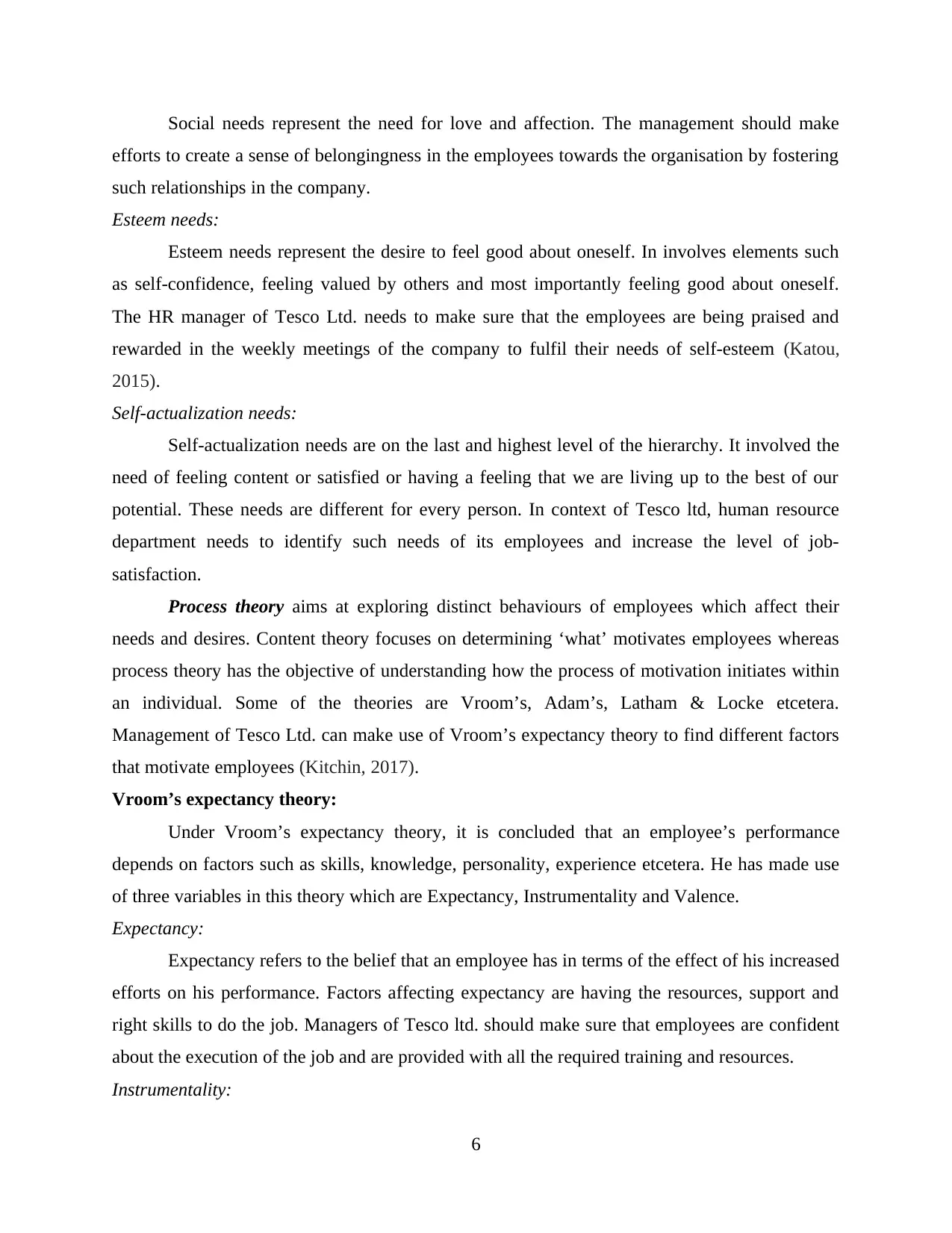
Social needs represent the need for love and affection. The management should make
efforts to create a sense of belongingness in the employees towards the organisation by fostering
such relationships in the company.
Esteem needs:
Esteem needs represent the desire to feel good about oneself. In involves elements such
as self-confidence, feeling valued by others and most importantly feeling good about oneself.
The HR manager of Tesco Ltd. needs to make sure that the employees are being praised and
rewarded in the weekly meetings of the company to fulfil their needs of self-esteem (Katou,
2015).
Self-actualization needs:
Self-actualization needs are on the last and highest level of the hierarchy. It involved the
need of feeling content or satisfied or having a feeling that we are living up to the best of our
potential. These needs are different for every person. In context of Tesco ltd, human resource
department needs to identify such needs of its employees and increase the level of job-
satisfaction.
Process theory aims at exploring distinct behaviours of employees which affect their
needs and desires. Content theory focuses on determining ‘what’ motivates employees whereas
process theory has the objective of understanding how the process of motivation initiates within
an individual. Some of the theories are Vroom’s, Adam’s, Latham & Locke etcetera.
Management of Tesco Ltd. can make use of Vroom’s expectancy theory to find different factors
that motivate employees (Kitchin, 2017).
Vroom’s expectancy theory:
Under Vroom’s expectancy theory, it is concluded that an employee’s performance
depends on factors such as skills, knowledge, personality, experience etcetera. He has made use
of three variables in this theory which are Expectancy, Instrumentality and Valence.
Expectancy:
Expectancy refers to the belief that an employee has in terms of the effect of his increased
efforts on his performance. Factors affecting expectancy are having the resources, support and
right skills to do the job. Managers of Tesco ltd. should make sure that employees are confident
about the execution of the job and are provided with all the required training and resources.
Instrumentality:
6
efforts to create a sense of belongingness in the employees towards the organisation by fostering
such relationships in the company.
Esteem needs:
Esteem needs represent the desire to feel good about oneself. In involves elements such
as self-confidence, feeling valued by others and most importantly feeling good about oneself.
The HR manager of Tesco Ltd. needs to make sure that the employees are being praised and
rewarded in the weekly meetings of the company to fulfil their needs of self-esteem (Katou,
2015).
Self-actualization needs:
Self-actualization needs are on the last and highest level of the hierarchy. It involved the
need of feeling content or satisfied or having a feeling that we are living up to the best of our
potential. These needs are different for every person. In context of Tesco ltd, human resource
department needs to identify such needs of its employees and increase the level of job-
satisfaction.
Process theory aims at exploring distinct behaviours of employees which affect their
needs and desires. Content theory focuses on determining ‘what’ motivates employees whereas
process theory has the objective of understanding how the process of motivation initiates within
an individual. Some of the theories are Vroom’s, Adam’s, Latham & Locke etcetera.
Management of Tesco Ltd. can make use of Vroom’s expectancy theory to find different factors
that motivate employees (Kitchin, 2017).
Vroom’s expectancy theory:
Under Vroom’s expectancy theory, it is concluded that an employee’s performance
depends on factors such as skills, knowledge, personality, experience etcetera. He has made use
of three variables in this theory which are Expectancy, Instrumentality and Valence.
Expectancy:
Expectancy refers to the belief that an employee has in terms of the effect of his increased
efforts on his performance. Factors affecting expectancy are having the resources, support and
right skills to do the job. Managers of Tesco ltd. should make sure that employees are confident
about the execution of the job and are provided with all the required training and resources.
Instrumentality:
6
⊘ This is a preview!⊘
Do you want full access?
Subscribe today to unlock all pages.

Trusted by 1+ million students worldwide
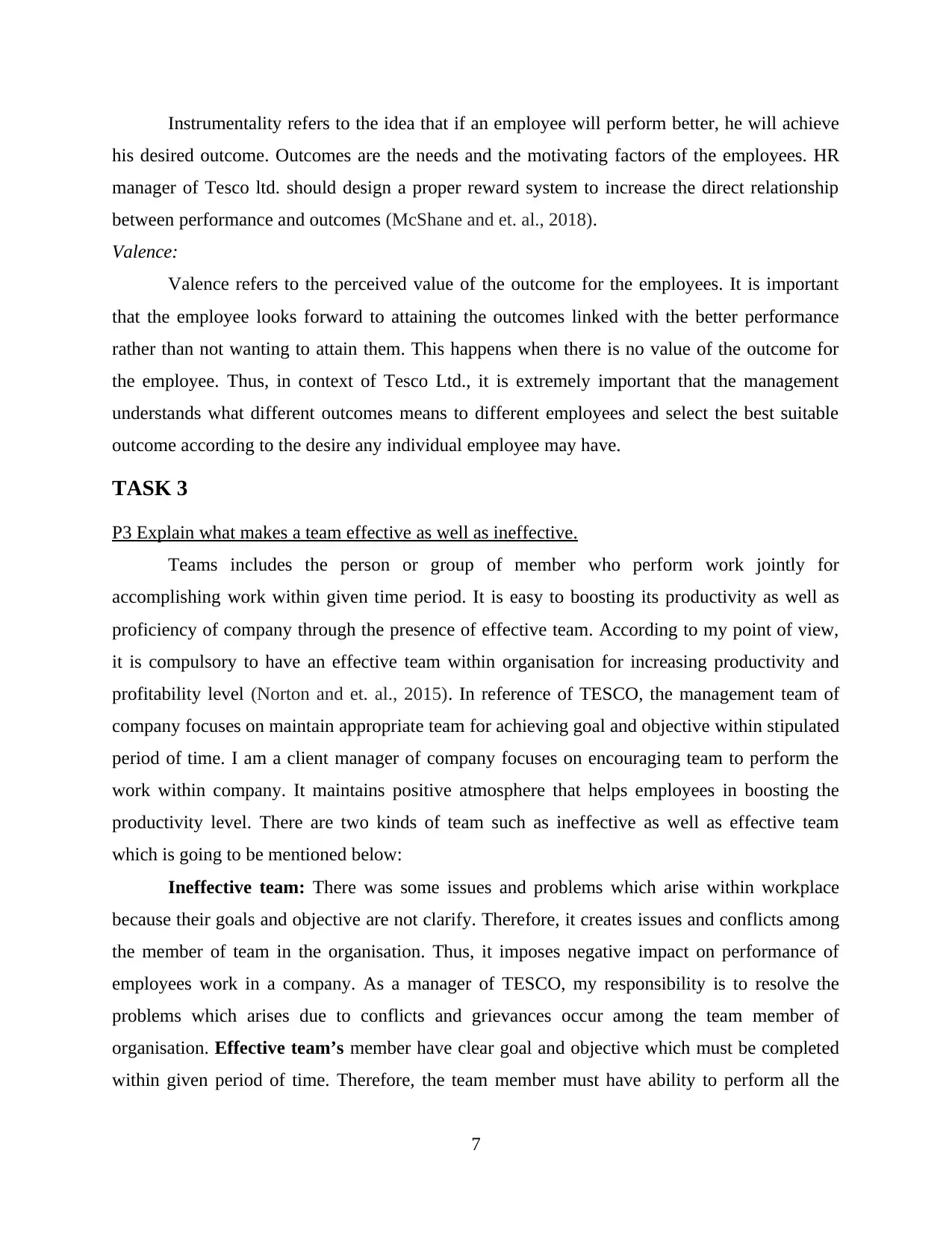
Instrumentality refers to the idea that if an employee will perform better, he will achieve
his desired outcome. Outcomes are the needs and the motivating factors of the employees. HR
manager of Tesco ltd. should design a proper reward system to increase the direct relationship
between performance and outcomes (McShane and et. al., 2018).
Valence:
Valence refers to the perceived value of the outcome for the employees. It is important
that the employee looks forward to attaining the outcomes linked with the better performance
rather than not wanting to attain them. This happens when there is no value of the outcome for
the employee. Thus, in context of Tesco Ltd., it is extremely important that the management
understands what different outcomes means to different employees and select the best suitable
outcome according to the desire any individual employee may have.
TASK 3
P3 Explain what makes a team effective as well as ineffective.
Teams includes the person or group of member who perform work jointly for
accomplishing work within given time period. It is easy to boosting its productivity as well as
proficiency of company through the presence of effective team. According to my point of view,
it is compulsory to have an effective team within organisation for increasing productivity and
profitability level (Norton and et. al., 2015). In reference of TESCO, the management team of
company focuses on maintain appropriate team for achieving goal and objective within stipulated
period of time. I am a client manager of company focuses on encouraging team to perform the
work within company. It maintains positive atmosphere that helps employees in boosting the
productivity level. There are two kinds of team such as ineffective as well as effective team
which is going to be mentioned below:
Ineffective team: There was some issues and problems which arise within workplace
because their goals and objective are not clarify. Therefore, it creates issues and conflicts among
the member of team in the organisation. Thus, it imposes negative impact on performance of
employees work in a company. As a manager of TESCO, my responsibility is to resolve the
problems which arises due to conflicts and grievances occur among the team member of
organisation. Effective team’s member have clear goal and objective which must be completed
within given period of time. Therefore, the team member must have ability to perform all the
7
his desired outcome. Outcomes are the needs and the motivating factors of the employees. HR
manager of Tesco ltd. should design a proper reward system to increase the direct relationship
between performance and outcomes (McShane and et. al., 2018).
Valence:
Valence refers to the perceived value of the outcome for the employees. It is important
that the employee looks forward to attaining the outcomes linked with the better performance
rather than not wanting to attain them. This happens when there is no value of the outcome for
the employee. Thus, in context of Tesco Ltd., it is extremely important that the management
understands what different outcomes means to different employees and select the best suitable
outcome according to the desire any individual employee may have.
TASK 3
P3 Explain what makes a team effective as well as ineffective.
Teams includes the person or group of member who perform work jointly for
accomplishing work within given time period. It is easy to boosting its productivity as well as
proficiency of company through the presence of effective team. According to my point of view,
it is compulsory to have an effective team within organisation for increasing productivity and
profitability level (Norton and et. al., 2015). In reference of TESCO, the management team of
company focuses on maintain appropriate team for achieving goal and objective within stipulated
period of time. I am a client manager of company focuses on encouraging team to perform the
work within company. It maintains positive atmosphere that helps employees in boosting the
productivity level. There are two kinds of team such as ineffective as well as effective team
which is going to be mentioned below:
Ineffective team: There was some issues and problems which arise within workplace
because their goals and objective are not clarify. Therefore, it creates issues and conflicts among
the member of team in the organisation. Thus, it imposes negative impact on performance of
employees work in a company. As a manager of TESCO, my responsibility is to resolve the
problems which arises due to conflicts and grievances occur among the team member of
organisation. Effective team’s member have clear goal and objective which must be completed
within given period of time. Therefore, the team member must have ability to perform all the
7
Paraphrase This Document
Need a fresh take? Get an instant paraphrase of this document with our AI Paraphraser

work in given period of time in systematic manner. In context TESCO, I am the client manager
of this company and my main purpose is to coordinate team to attain all work and task in less
time period. It helps in boosting future sales as well as growth of business organisation in
effective manner (Paull and Whitsed, 2018).
Tuckman Theory of team development
This theory was founded in the year 1965 by Bruce Tuckman. As a client manager of
company, my main purpose is to manage team in effective manner. It is necessary to have
capable and knowledgable employees to work in a company. There are five level which is used
in developing a team that is going to be mentioned below:
Forming: This is the basic level which is used for developing a team in effective manner.
As a client manager of TESCO company, it is my responsibility to assign task and work among
the team member that is performed by them in stipulated period of time. Therefore, there are
various people of different heritage and background perform work in order boost the productivity
as well as profitability level. Thus, as a manager, I am focusing on coordinating the different
member of team who are coming from different background and culture. It helps the company in
increase future sales and growth of company in effective manner (Pinho, Rodrigues and Dibb,
2014).
Storming: During the process of completing project , the team member providing
suggestions to each other. It create grievances and conflicts among the member of business
organisation. In this situation, my responsibility is to resolving these kind of issues and problem
occurs within company. In context of TESCO, my main purpose is to provide suggestion and
guidance among the team member in order to perform task within given time manner. Also,
resolve the conflicts and grievance which arise within workplace.
Norming: In this stage, the member work according to the rules, beliefs as well value in
which they are performing their work. According to my point of view, the member of team work
on the basis of value and beliefs. In context of TESCO, my responsibility is to manage the task
of team member in effective manner that helps them increasing performance level of employees
(Ramdhani, Ramdhani and Ainissyifa, 2017).
Performing: It is necessary to have high skill, knowledge, competence in subordinates
for performing the work in effective manager. As a Client Manager, it is my responsibility to
8
of this company and my main purpose is to coordinate team to attain all work and task in less
time period. It helps in boosting future sales as well as growth of business organisation in
effective manner (Paull and Whitsed, 2018).
Tuckman Theory of team development
This theory was founded in the year 1965 by Bruce Tuckman. As a client manager of
company, my main purpose is to manage team in effective manner. It is necessary to have
capable and knowledgable employees to work in a company. There are five level which is used
in developing a team that is going to be mentioned below:
Forming: This is the basic level which is used for developing a team in effective manner.
As a client manager of TESCO company, it is my responsibility to assign task and work among
the team member that is performed by them in stipulated period of time. Therefore, there are
various people of different heritage and background perform work in order boost the productivity
as well as profitability level. Thus, as a manager, I am focusing on coordinating the different
member of team who are coming from different background and culture. It helps the company in
increase future sales and growth of company in effective manner (Pinho, Rodrigues and Dibb,
2014).
Storming: During the process of completing project , the team member providing
suggestions to each other. It create grievances and conflicts among the member of business
organisation. In this situation, my responsibility is to resolving these kind of issues and problem
occurs within company. In context of TESCO, my main purpose is to provide suggestion and
guidance among the team member in order to perform task within given time manner. Also,
resolve the conflicts and grievance which arise within workplace.
Norming: In this stage, the member work according to the rules, beliefs as well value in
which they are performing their work. According to my point of view, the member of team work
on the basis of value and beliefs. In context of TESCO, my responsibility is to manage the task
of team member in effective manner that helps them increasing performance level of employees
(Ramdhani, Ramdhani and Ainissyifa, 2017).
Performing: It is necessary to have high skill, knowledge, competence in subordinates
for performing the work in effective manager. As a Client Manager, it is my responsibility to
8
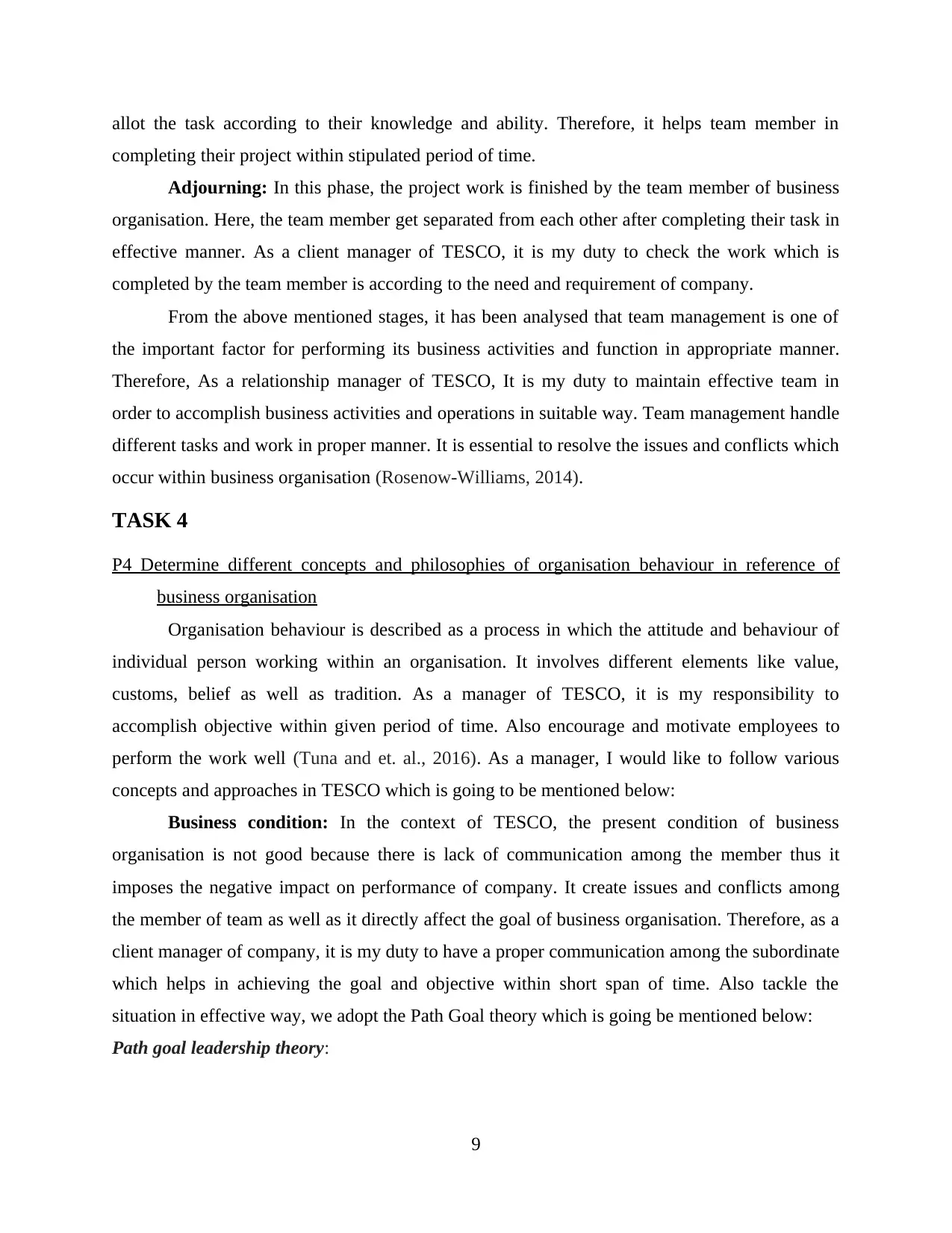
allot the task according to their knowledge and ability. Therefore, it helps team member in
completing their project within stipulated period of time.
Adjourning: In this phase, the project work is finished by the team member of business
organisation. Here, the team member get separated from each other after completing their task in
effective manner. As a client manager of TESCO, it is my duty to check the work which is
completed by the team member is according to the need and requirement of company.
From the above mentioned stages, it has been analysed that team management is one of
the important factor for performing its business activities and function in appropriate manner.
Therefore, As a relationship manager of TESCO, It is my duty to maintain effective team in
order to accomplish business activities and operations in suitable way. Team management handle
different tasks and work in proper manner. It is essential to resolve the issues and conflicts which
occur within business organisation (Rosenow-Williams, 2014).
TASK 4
P4 Determine different concepts and philosophies of organisation behaviour in reference of
business organisation
Organisation behaviour is described as a process in which the attitude and behaviour of
individual person working within an organisation. It involves different elements like value,
customs, belief as well as tradition. As a manager of TESCO, it is my responsibility to
accomplish objective within given period of time. Also encourage and motivate employees to
perform the work well (Tuna and et. al., 2016). As a manager, I would like to follow various
concepts and approaches in TESCO which is going to be mentioned below:
Business condition: In the context of TESCO, the present condition of business
organisation is not good because there is lack of communication among the member thus it
imposes the negative impact on performance of company. It create issues and conflicts among
the member of team as well as it directly affect the goal of business organisation. Therefore, as a
client manager of company, it is my duty to have a proper communication among the subordinate
which helps in achieving the goal and objective within short span of time. Also tackle the
situation in effective way, we adopt the Path Goal theory which is going be mentioned below:
Path goal leadership theory:
9
completing their project within stipulated period of time.
Adjourning: In this phase, the project work is finished by the team member of business
organisation. Here, the team member get separated from each other after completing their task in
effective manner. As a client manager of TESCO, it is my duty to check the work which is
completed by the team member is according to the need and requirement of company.
From the above mentioned stages, it has been analysed that team management is one of
the important factor for performing its business activities and function in appropriate manner.
Therefore, As a relationship manager of TESCO, It is my duty to maintain effective team in
order to accomplish business activities and operations in suitable way. Team management handle
different tasks and work in proper manner. It is essential to resolve the issues and conflicts which
occur within business organisation (Rosenow-Williams, 2014).
TASK 4
P4 Determine different concepts and philosophies of organisation behaviour in reference of
business organisation
Organisation behaviour is described as a process in which the attitude and behaviour of
individual person working within an organisation. It involves different elements like value,
customs, belief as well as tradition. As a manager of TESCO, it is my responsibility to
accomplish objective within given period of time. Also encourage and motivate employees to
perform the work well (Tuna and et. al., 2016). As a manager, I would like to follow various
concepts and approaches in TESCO which is going to be mentioned below:
Business condition: In the context of TESCO, the present condition of business
organisation is not good because there is lack of communication among the member thus it
imposes the negative impact on performance of company. It create issues and conflicts among
the member of team as well as it directly affect the goal of business organisation. Therefore, as a
client manager of company, it is my duty to have a proper communication among the subordinate
which helps in achieving the goal and objective within short span of time. Also tackle the
situation in effective way, we adopt the Path Goal theory which is going be mentioned below:
Path goal leadership theory:
9
⊘ This is a preview!⊘
Do you want full access?
Subscribe today to unlock all pages.

Trusted by 1+ million students worldwide
1 out of 16
Related Documents
Your All-in-One AI-Powered Toolkit for Academic Success.
+13062052269
info@desklib.com
Available 24*7 on WhatsApp / Email
![[object Object]](/_next/static/media/star-bottom.7253800d.svg)
Unlock your academic potential
Copyright © 2020–2026 A2Z Services. All Rights Reserved. Developed and managed by ZUCOL.





